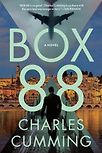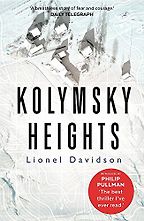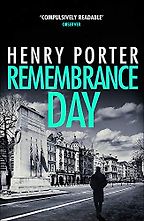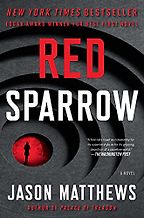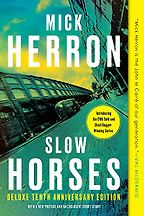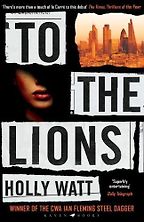You’ve picked five post-Soviet spy thrillers for us. I suppose, back in 1991, with the collapse of the Soviet Union, I might have naively thought that spy novels were going to disappear as a genre. Instead, there’s been a new phase. Can you describe what’s been going on?
As soon as the Berlin Wall came down and Yeltsin stood on his tank, readers and publishers alike felt that the spy novel was effectively over. What else was there to write about? You’d had four or five decades of Len Deighton, John le Carré, Robert Ludlum and many others, mining the seam of the Cold War—East versus West, Smiley versus Karla—all those wonderful novels. Now there was no antagonist. The West had won. This was a crisis in the real-life intelligence services too; they didn’t necessarily know what useful purpose they were serving. So you could say that the 1990s is the decade that the spy novel forgot. On this side of the Pond, with the exception of le Carré—who published four or five post-Cold War thrillers—there was only Remembrance Day by Henry Porter.
So, the 1990s was a dead decade, then suddenly the genre came back to life again?
Exactly. Two things happened in quick succession. The first was the ascent of Vladimir Putin to the Russian presidency. The second was 9/11. Both were game changers for the intelligence services and therefore for spy novelists. Suddenly there was a completely new canvas on which to draw, whether it was Islamist terrorism or Russia as an emerging gangster state. You had Putin’s spy cronies poisoning the likes of Alexander Litvinenko, Sergei Skripal and, more recently, Alexei Navalny (the theme of Judas 62). The invasions of Afghanistan and Iraq also provided huge amounts of material for spy writers, ditto Messrs Assange and Snowden.
You’ve left John le Carré off this list. Are these other books you’ve picked your five favourite post-Soviet spy novels?
They’re the five most interesting examples. The first one I’d like to discuss is Kolymsky Heights because it spans the late 1980s and the early 1990s. It’s a crossover novel: Lionel Davidson was writing it before the collapse of the Soviet Union, but it was published shortly afterwards. In many ways, it’s a throwback, an old-fashioned Cold War novel. But it had great success when it was first published in the mid-1990s and then had a reboot here in the UK about five years ago and sold like hotcakes, largely thanks to Waterstones getting behind it.
It’s a fabulous book, very detailed, very strange. It’s got a slightly ludicrous plot about a secret scientific facility in Russia and a very unusual hero: an Indigenous Canadian. It’s fantastically well written and the last third of the novel, the exfiltration out of Siberia across the Bering Strait into Alaska, is breathtaking.
Like Deighton and le Carré, Davidson came of age at the height of the Cold War. His first book was The Night of Wenceslas, the story of a young man who goes to Prague and becomes embroiled in the secret world. That’s a classic East versus West thriller.
And he lived some of it, didn’t he? He spent time in Prague.
I don’t think he was ever in the intelligence services but probably, like me, he had access to people who were.
I absolutely loved Kolymsky Heights. After you recommended it, I ordered every other book by Lionel Davidson I could find. The places he describes, the characters: I felt like I was in Siberia. The book felt realistic.
Yes, that’s the trick. You believe in it, even though the idea of a secret Soviet factory that’s doing research on strange monkeys—I can’t quite remember—is so fantastical. It’s almost like something out of science fiction, and you keep turning the pages. The choice of protagonist is also unusual. Apart from anything else, it’s an amazing feat of imagination.
Let’s turn to Remembrance Day by Henry Porter, which opens—very grippingly—with a terror attack in London.
It’s a brilliant opening scene. As far as I’m aware, he was the only new British writer to get any sort of publishing deal for a spy novel in the UK in this decade that the spy novel forgot. He has gone on to write at least half a dozen thrillers in that British tradition of the spy story that goes back to The Riddle of the Sands and Somerset Maugham, to Eric Ambler and Graham Greene, and eventually to le Carré and Deighton. The spy novel, I think, is a uniquely British genre. There are one or two exceptional American spy novelists—we’ll come to Jason Matthews and Dan Fesperman later—but generally the books tend to be much more gung-ho, militaristic. They’re less concerned with the business of intelligence gathering, the psychological minutiae of the characters, and instead put the emphasis on dirty bombs going off in Times Square, nuclear weapons being stolen or consignments of anthrax being leaked, that sort of thing. You could say that the British write for television; American spy novels are much more like big-budget Hollywood movies.
Without revealing too much, what does the plot of Remembrance Day revolve around?
It’s an IRA story, a throwback to the sorts of novels Gerald Seymour or Jack Higgins used to write. Before Putin and 9/11, the principal existential threat to the UK was Irish Republicanism: a bomb going off in Harrods, say, or a shopping centre in Manchester. After 9/11, groups like ETA and the IRA were effectively put out of business. The people who had been giving them financial or political support for idealistic or nationalist reasons—I’m thinking of the Irish diaspora in America, or Basque sympathizers in Spain and France—suddenly vanished. Terrorism was no longer romantic.
You mentioned American spy novels: shall we talk about Red Sparrow by Jason Matthews next?
When people think of American spy novels, they almost certainly think of Jason Bourne in the series by Robert Ludlum or of Jack Ryan in Patriot Games and The Hunt for Red October by Tom Clancy. As I said, they tend to be on a much bigger canvas. You might have the American president himself playing a key role or a senior general inside the Pentagon doing dastardly things to aid the military-industrial complex. You won’t have a George Smiley, sitting in a library painstakingly going through files or spending eighty pages talking to Connie Sachs. The Americans just don’t do it that way: they believe in heroes, action, sex and violence.
Red Sparrow is a really good example of an American spy novel. One of the reasons for that is that Jason Matthews, who sadly died this year, was himself a CIA officer. It’s almost always the case that the best spy novelists were themselves touched by the intelligence services in real life in some way. Charles McCarry, for example, was also in the CIA. Red Sparrow is a fantastically well written and authentic spy novel, but it also has those American characteristics of giving Vladimir Putin a walk-on part, scenes of fairly unrealistic, kinky sex, and violent characters meeting violent ends. Then, bizarrely, there’s a recipe at the end of each chapter, which is charming, but quite disarming at the same time. The book was a huge, huge bestseller in the United States when it came out and they made a film of it with Jennifer Lawrence. I wish they would do the same with some of Dan Fesperman’s books. He’s also a really first-class American spy writer who deserves a bigger readership.
Given honey traps are such an important part of the Russian spying arsenal—at least in fiction—it was fascinating reading about agents being trained to ensnare men in this very formulaic, no-nonsense, Russian way.
The book came out nearly a decade ago, and I think probably in the #MeToo era, a lot of the attitudes towards women and sex might fail to clear hurdles in American publishing today. That’s not to accuse Jason of sexism, it’s just that times have changed so much.
In terms of the spy novel genre, where do your books fit in?
I’m in the British tradition of broadly realistic stories of individuals working inside or outside the secret world, and the scrapes that they get into and the psychological impact of working in that world over a long period of time. I see myself in the tradition of Len Deighton, John le Carré and Eric Ambler, rather than in the tradition of Robert Ludlum, Tom Clancy, and Jason Matthews. You could say that British spy fiction is quieter and more nuanced. And we usually make less money!
That’s what I like about the genre, that sense of quiet. Without that much happening, there can be this huge buildup of tension. It’s like watching a Hitchcock movie, Rear Window or Dial M for Murder. The action is mostly very low key and that makes it more gripping, to me.
Hitchcock is a really significant figure in the spy genre. A number of films he made: Notorious, North by Northwest, Saboteur, Foreign Correspondent, The Man Who Knew Too Much are spy stories. They have tropes—either that Hitchcock borrowed from source novels or that he and his screenwriters invented—which served the spy genre, both on and off-screen, for the next half-century. In this respect, Hitchcock is almost as important to the serious thriller as John Buchan or Eric Ambler or Erskine Childers, the writer of The Riddle of the Sands.
Tell me about the series you’re writing now.
It began with a book called Box 88, which is coming out in the States next month. BOX 88 is an Anglo-American intelligence service operating without political oversight, under the radar, made up of various members of the CIA, MI5 and MI6 as well as Special Forces. They do the jobs that government-sanctioned intelligence services can’t or won’t do. In movie terms, it’s a kind of Mission Impossible unit, but they don’t have melting masks or Tom Cruise clinging to the side of a cargo plane as it takes off.
I’d always wanted to write a novel set in the 1990s, to examine what MI5 and MI6 were up to in that decade without spy stories. What you get in Box 88—and its sequel, Judas 62—is two stories for the price of one. You see the recruitment and the development of a young spy called Lachlan Kite. He’s recruited in 1989, straight out of school, at the age of 18. You see his early operations as fledgling spy through the 1990s. But you also see him in the present day when those operations have come back to haunt him. He’s a man of 50 who has lived in this strange, compelling world for 30 years; you see the person he has become.
The travel element is another thing I love in spy novels. In Judas 62 I liked being in a town in provincial Russia in the 1990s in the first half, and then being in Dubai in the second half.
That’s always been the juice for me. I love going to these places, eating the food, smelling the air and talking to people on the ground, getting stories and information out of them that inspire a work of fiction. Judas 62 was unusual in that I couldn’t go to Voronezh to research the Russian parts because of the pandemic. I was relying completely on people who had been there or had lived there, or secondary sources, YouTube, Google Maps. But I did go to Dubai two or three times. Unlike most people, I really liked it. It’s a fascinating place.
The other major change to spy fiction in the last 30 years—apart from Putin, al Qaeda and ISIS, Snowden and Assange—is technology. Judas 62 tries to show you how the world of spying has changed since the Cold War. In the 1993 section, Kite obviously has no access to mobile phones, to Wi-Fi, to satellites: he’s completely isolated in Russia and has to fend for himself. The Kite of 2020 in Dubai, on the other hand, is under 24-hour surveillance from CCTV and number plate recognition cameras. His phone, his credit cards, his search engine metadata give him away all the time. The mobile phone has totally changed not only intelligence work, but also storytelling.
Because you’re no longer isolated, you mean?
Yes. You can always call for help. If somebody needs to get hold of you, you can be reached. You can be followed. Somebody can demonstrate from your mobile phone that you were in a place where you shouldn’t have been. If you don’t have a mobile phone with you because you’re going to meet somebody you shouldn’t be meeting—a Russian intelligence officer for example—that, in itself, is suspicious. Why would somebody ever be without their mobile phone? So they always have to be taken into account, in the field and on the page.
Five Books interviews are expensive to produce. If you're enjoying this interview, please support us by donating a small amount.
Technology has inverted spying and spy fiction. For example, it’s now more or less impossible for an intelligence officer to take on a fake identity in a hostile state. In the classic Cold War novels, the hero could go to East Germany as Mark Jones and it would be very easy to stand that legend up. If they fell under suspicion, the Stasi would make a phone call to London and ask, ‘Have you ever heard of Mark Jones?’ And the answer would be, ‘Oh yes, we know Mark very well’ because it would be MI6 answering the phone. Nowadays, if a spy goes to Dubai and pretends to be Mark Jones it’s impossible because of online banking records, Twitter, Facebook, retinal scans, biometric passports and all the rest. The authorities can check out your story in a thousand different ways. It’s impossible to make a legend stand up under even moderate scrutiny.
Do you think that means the profession attracts a different sort of spy—or are the underlying skills needed pretty similar?
The skills needed are still quite similar. Obviously, they need people with technical proficiency, computer wonks and programmers. They also need people who can speak Mandarin, Farsi, Russian, Arabic. It’s almost put six foot six white, old Etonian men like me out of business; they want people who have an ethnic background that will allow them to blend into different environments in the Middle East, Russia, China or wherever.
Let’s go on to the next post-Soviet spy thriller you’ve chosen: Slow Horses by Mick Herron, the first book in his Slough House series.
In culture, if you do something new, something original, something that hasn’t been seen before, you will be rewarded. Mick’s books are hugely popular, not just here, but everywhere and I think the principal reason for that is that he’s done something new, which is almost to send up the world of John le Carré, to satirize it. His world is located somewhere between the Circus and The Office. The books are very funny, they celebrate failure, heroism against the odds, and have an old-fashioned bawdy, music hall humor. It’s a very clever reimagining of a world that was extremely familiar to readers, from The Spy Who Came in from the Cold onwards.
Are the plots any good? Or is it all about the comedy?
Yes, they’re clever, intricate plots. The books are addictive and funny but shot through with political seriousness.
Let’s turn to the last book you’ve recommended, which is To the Lions by Holly Watt. This won the ‘Ian Fleming Steel Dagger’ in 2019, which is an annual award given by the British Crime Writers’ Association for the best thriller of the year.
What we haven’t really mentioned so far is female spies and female spy writers, largely because they are few and far between. It’s always been a very male genre on both sides of the Atlantic. One exception was Helen MacInnes, who died in 1985 and isn’t read much anymore.
In the post-Cold War, post-9/11 world, however, you have Holly Watt and Charlotte Philby, who are writing not specifically spy stories, but political thrillers from a female point of view. In the case of To the Lions, Holly Watt’s first book, it’s about a tough, hard-bitten female journalist, Casey Benedict. Journalism and spying are quite similar professions. They’re both about finding out information, about scoops and employing cloak-and-dagger tradecraft to get what you want. Holly and Charlotte are both doing something new, which is to put women front and center in stories which have been typically male-dominated—from James Bond to George Smiley to Jackson Lamb.
Her books have an international dimension as well, right? The plots take us to Libya or a Rohingya refugee camp in Bangladesh.
That international dimension is almost a trope of spy fiction. You don’t really get it in crime fiction, because it tends to be a murder and so everybody has to stay in one place, working out whodunnit. If it’s a detective story, a policeman is going to have an area of a city or a town that he or she is responsible for. Whereas spy fiction tends to roam from country to country, largely because that’s what the CIA and MI6 do: their job is to go to far-flung places and to save the world. Holly’s plots work on a big canvas and the journalists seem to have bottomless pits of money, but there’s a moral purpose to her books too. She wants to educate readers about what’s going on in the world and what might happen next. That makes them doubly interesting in my view.
December 18, 2021. Updated: October 3, 2025
Five Books aims to keep its book recommendations and interviews up to date. If you are the interviewee and would like to update your choice of books (or even just what you say about them) please email us at [email protected]

